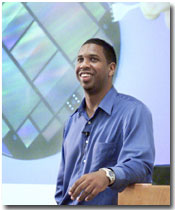Hakeem Oluseyi
Hakeem Oluseyi, an astrophysicist, inventor, educator, amateur voice-actor, and self-described “regular guy” from Mississippi, doesn’t remember exactly how he first became interested in science, but says, “I’ve always thought scientists were supercool.”

Hakeem Oluseyi
Oluseyi, now a professor of physics at the University of Alabama, grew up in very modest circumstances, living with his single mother in ghettos all over the south. They moved often, he says, following “opportunity,” but things never really got much better in any place they went
In the ghettos, as the new kid, you were expected to fight somebody to prove yourself, says Oluseyi. But Oluseyi wasn’t interested in fighting, so he stayed indoors a lot, where he did a lot of reading. His mother, who also loved reading, encouraged him by bringing home books about science from the library. Through his reading, at age 11, Oluseyi discovered Einstein’s work. “It just knocked my socks off!” he recalls. “I was like, what?!? Mass increases? Length contracts? Oh, my god!!” he says. “I did everything I could to get my head around this stuff.”
His original enthusiasm never wore off. In high school, he won a prize in the state science fair for a computer program that did relativity calculations. Oluseyi remembers the judges telling him he should consider becoming a physicist when he grew up. “I didn’t know what a physicist was or what they did,” he says, “but I had never heard of it being associated with money, so I thought to myself, ‘no way dude, I’m not doing that.’”
He did continue to be interested in physics, however, and after graduating from high school and spending a short time in the military, he enrolled at Tougaloo College, a small, historically black college in Tougaloo Mississippi, where he was one of two physics majors.
A summer research program at the University of Georgia gave Oluseyi his first taste of life in the research world. He enjoyed the work, but was really shocked by the freedom and responsibility he was given. In the minimum wage jobs he’d held before, supervisors were always looking over his shoulder, never trusting him. But at the lab, his supervisor immediately gave him a key to the building and told him he could work whatever hours he chose. In fact, even though there were few other African Americans, Oluseyi felt comfortable and accepted in the research community, he says. “Life in the research world was very different from my life as a ghetto kid.”
Oluseyi went on to Stanford University for graduate school, but found he was academically unprepared and needed to take undergraduate courses to catch up. It was extremely difficult, he says, and at times Oluseyi considered dropping out. But a combination of support from his research advisor, Art Walker, and Oluseyi’s “I’ll show you” attitude helped him stick with it, and he received his PhD in 1999.
After earning his PhD, Oluseyi worked for several years at Applied Materials, Inc. in Silicon Valley, where he did research on manufacturing computer chips and on creating the next generation of transistors, work that resulted in several patents. When the high-tech boom ended, Oluseyi did some soul searching. While at Applied Materials, Oluseyi had also been teaching some astronomy classes at a local community college, and had been hoping to return to academia. He also realized he wanted to work on bigger problems than semiconductor manufacture.
He found the opportunity to work on bigger problems when he took a post-doctoral position at Lawrence Berkeley National Laboratory, working on instrumentation for a project called the SuperNova/Acceleration Prove (SNAP) mission, a space-based telescope for observing supernovae. This mission, after its launch in 2010, would observe thousands of supernovae a year, and enable scientists to learn more about the distribution of the mysterious “dark energy” that many believe is driving the accelerating expansion of the universe.
Though the SNAP mission was exciting, in January 2004 Oluseyi left the Lawrence Berkeley Lab to take a professorship at the University of Alabama. He’s continuing to collaborate with the SNAP project, and also developing some projects of his own, including a proposal for a mission to observe the solar atmosphere at very high spatial and temporal resolutions.
In addition to his research and teaching, Oluseyi has been highly involved in outreach. With an organization called Cosmos Education, Oluseyi has trekked across sub-Saharan Africa, sleeping in tents and visiting schools to inspire young students. The group performs science demonstrations for the students, and discusses of basic science principles as well as issues relevant in Africa, such as sustainable development and HIV awareness. Simply seeing successful scientists of African heritage like himself encourages the students, says Oluseyi.
Oluseyi has also inspired and advised students here in the United States. He finds that students can easily relate to him because of his modest background. “Some scientists present themselves as super-intellectual, and I go out of my way to present myself as a regular guy,” he says. “Because I’m from such humble origins, I can really talk to students.”
With all the time he spends doing research and teaching students, Oluseyi has had little time for a life outside of science, but has managed to find time for some voice acting work. You may have heard him in commercials for Charles Schwab, the MixMan digital music mixer, and other products.
“That’s my life. I educate, I inspire, and I research. And I work too much,” Oluseyi says. “I have to pinch myself sometimes. I couldn’t be happier.”











